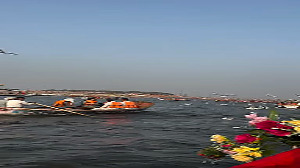'My sister Devyani, whom we all called 'Devi', was teased regularly on the school playground with the taunt: Davy Crockett, queen of the wild frontier!' Kamdar, daughter of an Indian father and a Danish-American mother, remembered in an essay not long ago.
'It seemed the only way we children could be understood by white Americans was within the context of cowboys (or cowgirls) and Indians,' Kamdar, the author of the recently published Planet India, How the Fastest-Growing Democracy is Transforming America and the World, continued.
'To be an Indian from India was something so entirely outside the normal frame of most people's reference as to be, literally, unimaginable. Our father's exotic looks were automatically identified as Mexican, and people were shocked, even offended, that he did not speak Spanish. India did not figure at all on the map of American identity in those days.'
Even today India does not figure on the map of most Americans, she feels, though America is now closely linked with India.
Kamdar, a senior fellow at the World Policy Institute at the New School University and a frequent commentator on India for the CNN, BBC, and the Los Angeles Times and the Chicago Tribune, is now telling mainstream America that just as India is transforming itself from a developing country into a global powerhouse in record time, they (the Americans) better get to know the country well.
More important, they better be prepared to learn from Indian experiments.
Kamdar's first book Motiba's Tattoos was published in 2000 to critical acclaim. In that book Kamdar, born and raised in America, set out to rediscover her family's story by tracing its journey from an isolated corner of Gujarat -- where her grandfather Prabhudas Bhagwanji Kamdar lived in the Gandhian tradition of simplicity -- to the Web-wired world of 21st-century America.
In her new book, Kamdar, who has been visiting and living in India since 1960, is on a more challenging discovery.
"Till recently India has been changing almost imperceptibly," she muses. "But in the course of the last two years, each time I went to India, I felt I was watching time-lapse photography. I don't think there is any precedent in human history -- with perhaps the exception of China -- for the transformation we are seeing in India today, in its sheer magnitude and speed."
"An average American even today knows very little of India," she continues, getting ready to promote her book in India, and then in America.
"India is everywhere across America," she explains. "I am not referring just to the high tech workers, the Silicon Valley entrepreneurs and smart graduate students. Indian movie studios help produce animated films for the likes of Disney, and Indian software manages medical records of millions of Americans. Indian customer services centres answer our phone calls."
But her book is far more than celebrating India's startling success story, she says. "It is very bullish on India but there is also strict love in it. It is like a parent telling the child how to be healthier and better behaved."
The book argues that while India has tremendous amount of poverty and inequality, environmental degradation and incidents of HIV/AIDS, it can still create an exemplary 21st-century society.
"Many of the problems India is facing are also inherent in America and the advanced countries, though they are far less in volume," she says. "There is shocking poverty in America and the gap between the rich and the poor is escalating. That is why if India can transform itself into a more dynamic society that really cares about its poor and disadvantaged, it can offer powerful examples not only to America but to any country in the world.
"For every challenge we face in America today, India does have critical relevance," she explains. "I have written extensively in my book about grassroot workers in India who are battling for the environment. Surely, America can learn from such activism.
"Whether combating global terrorism to finding cures for dangerous pandemics to spurring new jobs and improving lives, India can be a pivotal player," she adds.
"As goes India, so goes America and the rest of the world."
India is in a race against time to bring the benefits of the 21st century to more than half its population that lives in poverty, she continues. "There are 800 million Indians who live on less than $2 a day," she says. "India cannot export its poor like the way the industrializing countries did in the 18th and 19th centuries," she continues. "There are about 15 million people of Indian origin outside India but many of them migrated before the planet earth was overcrowded."
"And that means India has to devise an environmentally sustainable and politically viable society on a scale never before imagined or achieved," she adds.
She recalls in her book Nobel Laureate Rabindranath Tagore writing 90 years ago: 'In finding the solution to our problem, we shall have helped to solve the world problem as well If India can offer to the world her solution, it will be a contribution to humanity.'
"What India can do to create a better society will be far more attractive than what China does," Kamdar says. "For India is still a viable democracy. It is an open, vibrant society."
That is one of the reasons globalisation in India can have a very different kind of impact, she feels. You cannot think of India as a victim of some imagined American corporate plot to enslave the country, she notes.
"India has a strong government that can tell the multinationals how to function," she says. "Successful Indian companies are partners in the globalization process."
The world needs to cheer India, she feels. True, she says, India's task of transforming itself into a developed country that takes good care of its citizens is breathtaking in scope.
"I wrote this book to people across the world and in India to know what is at stake," she says. "If India fails, our world could become even a bigger hostage to political chaos. There could be wars over dwindling resources, especially water, and a poisoned environment, and galloping pandemics."
But if India succeeds, it will challenge everyone, especially multiethnic and multireligious countries to be genuine democracies, Kamdar adds. It will prove then democracy is not a luxury just for rich societies.
"The increasingly fractious and polar world then will learn from India valuable lessons," she asserts. "That is why I argue that India's gambit is truly the venture of this century."
Photograph: Courtesy www.mirakamdar.com






 © 2025
© 2025